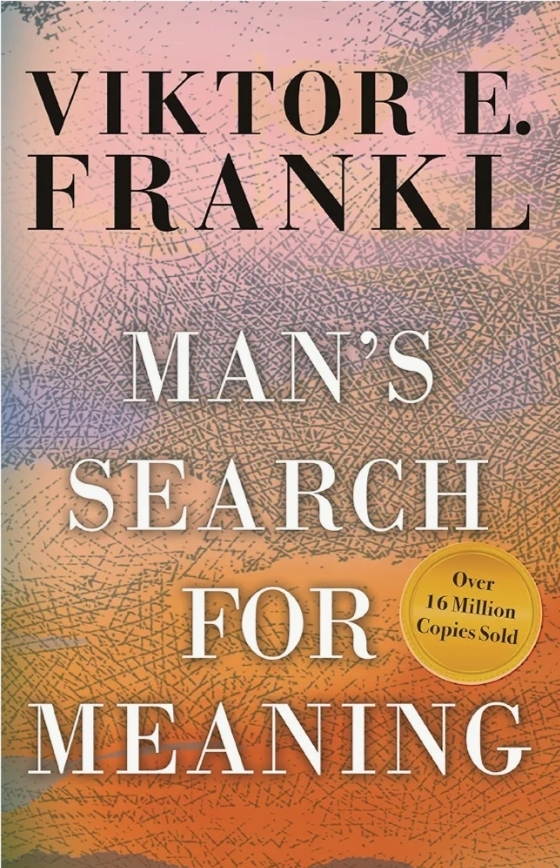Man’s Search for Meaning by Viktor E. Frankl is one of the most influential books of the 20th century, combining his experiences as a Holocaust survivor with his psychological theories. The book outlines his existential philosophy, the foundation of his psychological approach, logotherapy. The work is divided into two major sections: Frankl’s experiences in Nazi concentration camps and an explanation of his psychological theory.
Part 1: Experiences in a Concentration Camp
In this section, Frankl describes his harrowing time spent in the concentration camps, most notably Auschwitz, during World War II. He witnessed the brutal realities of the camps, the constant threat of death, physical and emotional suffering, and the degradation of human dignity. Frankl’s purpose in recounting these experiences is not merely to chronicle the horrors, but to understand how individuals can endure such extreme circumstances and even find meaning in the face of overwhelming suffering.
- The Loss of Identity:
Frankl describes the initial shock of being imprisoned, where all the prisoners had their personal identities stripped away. Their names were replaced with numbers, and they were subjected to grueling physical labor, torture, and the constant threat of death. Despite this, Frankl observed that some prisoners were able to maintain their inner dignity, while others gave up and succumbed to despair. - The Psychological Phases of Inmates:
Frankl divides the psychological responses of prisoners into three stages:- Shock upon entering the camps, realizing the gravity of their situation.
- Apathy in the face of the daily brutality, where the prisoners became emotionally numb to the horrors around them as a protective mechanism.
- Depersonalization or the loss of self-worth, when many prisoners gave up all hope and ceased to make an effort to survive.
- The Search for Meaning in Suffering:
Frankl observed that the strongest factor in determining whether a prisoner survived or not was their ability to find meaning in their suffering. For some, meaning came from a sense of duty to loved ones, a desire to finish an important project, or a spiritual purpose. He noted that even in the most excruciating circumstances, those who found meaning could maintain a degree of dignity, resilience, and inner strength.Frankl also observed that those who had no reason to live beyond the suffering, or who had no vision for the future, were the ones most likely to perish. In his own case, Frankl found meaning in his work as a psychiatrist, maintaining the belief that he would survive to finish his book and reunite with his loved ones. - Freedom of Choice and Inner Strength:
One of Frankl’s central points is that even in the most terrible situations, people have the power to choose their attitude toward their circumstances. He emphasizes that although one cannot control external events, they can control their internal reactions. This inner freedom is the ultimate source of human dignity and strength.
Part 2: Logotherapy – A Theory of Meaning
The second part of the book delves into logotherapy, the therapeutic approach that Frankl developed. Logotherapy is founded on the belief that the primary motivational force in humans is the search for meaning. Frankl’s work in psychology focuses on helping individuals find purpose in life, especially when confronted with suffering, loss, or challenges.
- The Will to Meaning vs. The Will to Power and The Will to Pleasure:
Frankl critiques the views of other psychologists such as Sigmund Freud (who emphasized the will to pleasure) and Alfred Adler (who focused on the will to power). Frankl asserts that the will to meaning is the primary drive in human beings. The pursuit of pleasure or power cannot sustain an individual in the long term; only the pursuit of meaning gives life true purpose. - The Existential Vacuum:
Frankl warns that in the modern world, many people suffer from an existential vacuum, a sense of emptiness and a lack of purpose. He explains that this vacuum often leads to neurotic behavior, depression, addiction, and other psychological issues, as people try to fill the void with superficial pleasures, materialism, or distractions. Logotherapy aims to help individuals find meaningful goals and connect to a sense of purpose. - Three Ways to Find Meaning:
Frankl explains that meaning can be found in three primary ways:- Through work or accomplishment, where an individual contributes something meaningful or achieves a personal goal.
- Through relationships with others, especially by loving others and being loved.
- Through suffering when unavoidable, by choosing how to respond to suffering in a way that affirms one’s dignity and humanity. Frankl suggests that even when suffering is unavoidable, it is possible to find meaning by the attitude one chooses toward it.
- Responsibility and Free Will:
Frankl believes that individuals have the freedom to choose how they respond to life’s challenges. This means that we are always responsible for our attitudes and reactions, even in situations of immense suffering. By recognizing that we are free to choose our response to life’s events, we reclaim our dignity and ability to create meaning. - Self-Transcendence:
Frankl also discusses the concept of self-transcendence, which is the idea that true meaning in life often comes from focusing beyond oneself—whether through love, work, or devotion to a cause. The more we focus on something greater than our own ego, the more fulfilling our lives become.
Key Takeaways from Man’s Search for Meaning
- Meaning, Not Happiness:
Frankl emphasizes that happiness is not the goal of life; instead, the pursuit of meaning is what gives life depth and significance. Happiness follows when we are living a life aligned with our values and sense of purpose. - Suffering and Meaning:
Frankl suggests that suffering is a part of life. However, it is how we respond to suffering that determines whether it will break us or strengthen us. By finding meaning in suffering, we can transcend pain and continue to grow. - Choice and Responsibility:
One of Frankl’s most important lessons is that we have the freedom to choose how we respond to every situation. Even when faced with immense hardship, we can choose to maintain our dignity and purpose. - The Role of Love and Relationships:
Frankl highlights that love is one of the most powerful sources of meaning. Through our relationships with others, especially in showing love and compassion, we can transcend our suffering and create meaningful lives. - Logotherapy’s Focus on Meaning:
Logotherapy encourages people to find purpose in life through work, love, and even suffering. It shifts the focus from seeking pleasure or avoiding pain to discovering and living out one’s unique meaning.
Conclusion
Man’s Search for Meaning is a transformative work that provides valuable insights into the human capacity for resilience and strength in the face of suffering. Frankl’s observations about the power of choice, the importance of meaning, and the role of suffering offer a profound perspective on how we can live a life of significance and purpose. In a world filled with distractions and superficial pleasures, Frankl’s message encourages us to find deeper meaning and connect with our true purpose in life.







